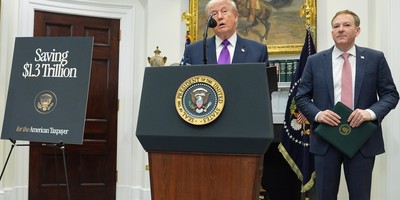Townhall Magazine's August issue is hitting subscriber mailboxes now! If you want to get the latest original content from Townhall's conservative talent weeks before it goes online, subscribe here now!
Below is an excerpt from Kevin Glass's August feature story, "Rand Paul vs Marco Rubio for the Foreign Policy Soul of the Republican Party."
On March 6, 2013, Sen. Rand Paul (R- KY) rose to take the floor and speak on the subject of President Obama’s nomination of John Brennan for CIA director. Brennan was the architect of Obama’s drone program, which the White House had been using to assassinate terrorists overseas.
Over the course of the next 13 hours, Paul made his objections widely known. From his discomfort with the broad unilateral authority that Obama claimed, to the controversy surrounding targeted killings of American citizens overseas, to the scary potential that military-style drones might be brought to American shores.
Paul’s skepticism when it comes to expansive foreign policy is and was well-known. But his half-day filibuster, the second-longest in history, vaulted him into the national conversation and sparked interest across party lines. What was also surprising was the cadre of senators who joined in, and one in particular: Sen. Marco Rubio (R-FL).
Rubio and Paul have offered divergent views of American foreign policy ever since they were both elected to the Senate in 2010. Their disagreements are cordial and their offices maintain a good working relationship. But there is nonetheless an ideological battle occurring, not only on Capitol Hill, but throughout the Republican Party and across the country.
Recommended
A new crop of Republicans have comprehensive ideas for how security policy should evolve in the 21st century, and while they by and large are conducting these debates jovially, they are nonetheless fighting for nothing less than the soul of the Republican Party.
A LONG WAY FROM THE BUSH ERA
In 2001, in the wake of the worst terrorist attack on American soil in the nation’s history, the United States made some monumental changes in how we conducted international affairs.
After 13 years, two formal wars, multiple tertiary conflicts, and two presidents, Americans’ attitudes about national and international security have changed. There is a cold war brewing in the Republican Party over the utility of our security measures and how conservatives should approach the future.
President Bush chose to implement broad security powers in the U.S. and to aggressively pursue terrorists and state- sponsored terrorism abroad. The Republican Party had few dissidents from these policies in the Bush years, but Obama’s conduction of the War on Terror has caused more people to doubt the effectiveness of our post-9/11 security measures.
Opposition to the Iraq War has hovered above 50 percent since early in Bush’s second term and Republican support for the war has steadily fallen. Obama has made winding down the war in Afghanistan a priority as support for our military force there has fallen. Some of the domestic intelligence operations undertaken by Bush and Obama have also come under fire from both Republicans and Democrats.
We’re a long way from 2007, when former-New York City Mayor Rudy Giuliani put his mark on his bid for president by stamping out the anti-interventionist rhetoric of former- Rep. Ron Paul (R-TX). With the shift in partisan control of the White House, more Republicans have become skeptical of broad security powers emanating from the White House. The anti-Washington sentiment that motivated 2010’s midterm electoral victories sent a new wave of Republicans to the Senate who have begun shaping the GOP’s future security vision. People like Rubio, Paul, along with Sens. Kelly Ayotte (R-NH), Mike Lee (R-UT), and Ted Cruz (R-TX) have taken an active role in our security policy.
The only catch is that they’re not always pulling in the same direction.
FROM MCCAIN TO RUBIO
For decades Republicans had dominated Democrats on foreign policy. And Bush’s decisive action in the wake of 9/11 only increased that dominance. Even after the American public turned against the war in Iraq, Sen. John McCain (R-AZ) still enjoyed a small lead over Obama on foreign policy issues as he headed for defeat in November. ...

























Join the conversation as a VIP Member